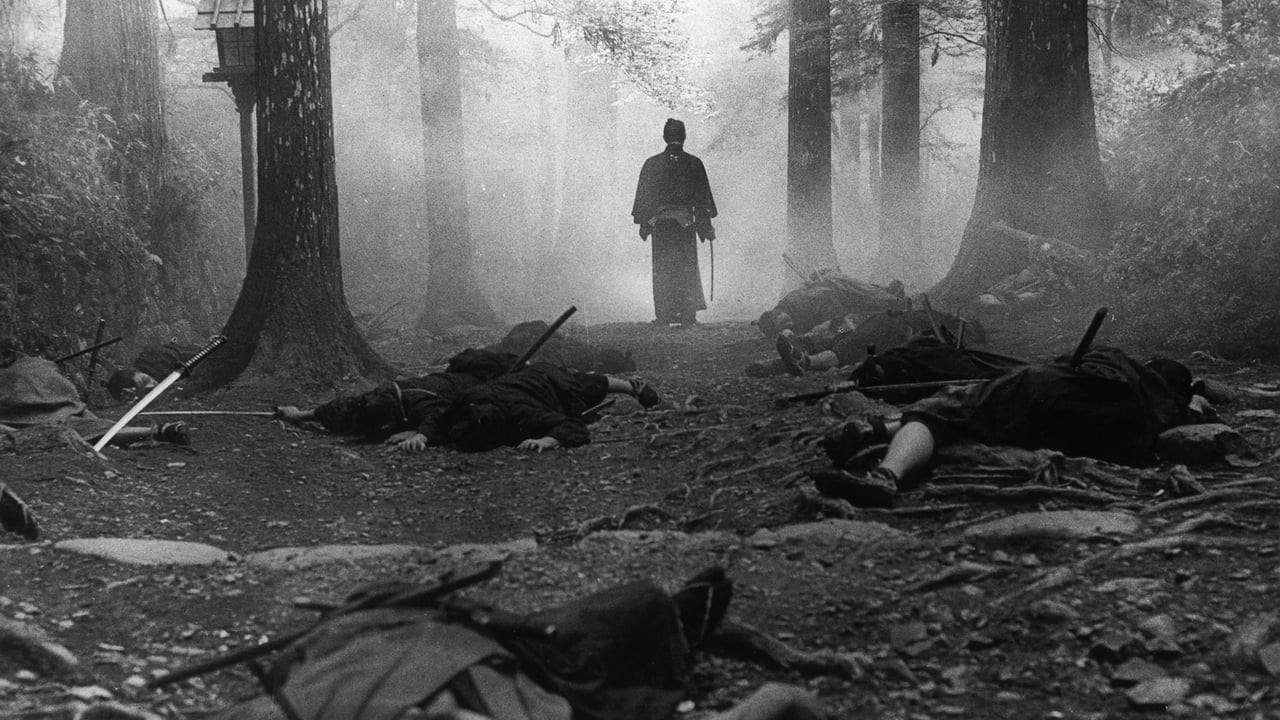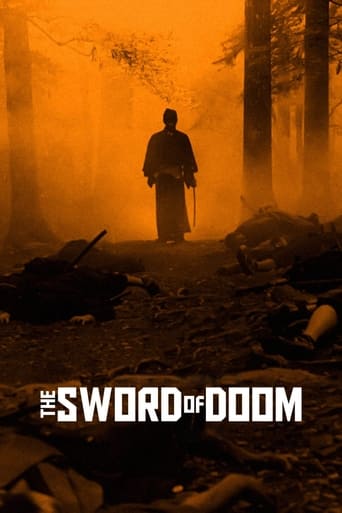

Through his unconscionable actions against others, a sociopath samurai builds a trail of vendettas that follow him closely.This film embraces the anti-hero sentiment of the 1960s, as seen in spaghetti westerns and the like. This is violence to a new degree, and a hero we really do not want to stand behind, but cannot help but watch his exploits. This is stylized violence, a kind that was very influential. Notably on Sam Peckinpah, but obviously on future generations such as Quentin Tarantino, as well.Placing this in the context of the samurai film is not something i am qualified to do. However, of those I have seen, I can certainly say this had far more action and much less ritual than what is often seen (such as in the films of Kurosawa).
... View MoreSword of Doom / Daibosatsu Pass is a fundamentally tonal movie about an inhumanly isolated individual, fencing master Ryunosuke Tsukue, an ostracised man who has become an island, or rather a jagged reef, on which he allows people to be dashed. I think it's quite easy to write him down as either an evil or sociopathic man, however I think the film deals with more complex issues.Ryunosuke is brimful of disdain. His hatred for the way people are, of how compromised and unworthy people become in order to fit in, is seen in several places in the film. Indeed Ryunosuke's exile arises out of his refusal to compromise and betray his code of fencing for the greater good. Many see his actions as provocative, but, like his fencing technique, Kogen Ittō-ryū, Ryunosuke is fundamentally passive until pushed. I have read people interpreting Ryunosuke's actions before his duel with Bunnojo Utsuki as designed to provoke his opponent, however in my opinion he was merely acting out of contempt for others' capacity for dishonour; contempt for one woman's easy virtue, and another man's illegal tactic.His worldview reaches perfect expression during his militia's meeting with Lord Kamio, who earns a degree of respect from Ryunosuke, when he honestly and brazenly admits to the audience of hypocritical fanatics he controls, that he is not interested in politics. Serizawa's faction of the Shinsengumi, which Ryunosuke joins, were known as the wolves of Mibu, and are shown in this film as being ambitious agitators operating under an arbitrary flag, with only nominal political pretensions. Incidentally, Serizawa Kamo, and Kondo Isami, both characters in this film, were actual historic leaders of the Shinsen Group.Every killing Ryunosuke performs in the film can be linked to the death wish of his victim. So despite the ease in which he cleaves flesh, I don't see him as an anarchical madman, more an amplifier of negative behaviour, a quasi-religious force.The movie has supernatural elements, too late Ryunosuke begins to realise that his life is filled with rather too many coincidences and that he is being driven mad by his own nihilism and its karmic response. Sword of Doom is a hideous film, with a superb central performance from Tatsuya Nakadai. Watch it with the awe that it deserves.
... View MoreIn feudal Japan,Ryunosuke (Tatsuya Nakadai)is a disgraced samurai and master swordsman with a very special technique, is due to have a challenge duel at his fencing school, his challenger Bunnojo Utsuki is to become a new sword master at the fencing school, but if he loses, he will be disgraced and unable to take his position. Bunnojo's wife Ohama pleads with Ryunosuke to throw the match, offering her virtue in return, which he accepts, despite this he still kills her husband after he makes an illegal fencing move, in a fit of anger after learning of his wife's infidelities. Some years later Ryunosuke has now taken Ohama as his woman, he's becoming ever more deranged and randomly kills people for no reason other than he likes it. Nothing seems to content Ryunosuke, not even his newly born son, "I trust only my sword in this world. When I fight, I have no family" says the cool killer to his new spouse after she pleads with him to give up his killing ways, he seems like a lost soul just searching for a cause to fight for or waiting for his own death, but unable to find an opponent capable of fulfilling his wish. He tries to challenge another master swordsman Shimada (Toshiro Mifune) but all he succeeds in doing is denting his own confidence after Shimada disposes of dozens of Ryonosuke's henchmen and leaves him with a few words that hurt more than any sword, "The sword is the soul. Study the soul to know the sword. Evil mind, evil sword" Sword of doom is full of many side plots, very few of which are fully explained, but its an epic beautifully filmed tale of an antihero, that despite his bad character traits, that should have the viewer loathing him, yet he still retains somewhat of a hero status with the viewer, due mainly to the fantastic, intense performance by Nakadai which is exemplified perfectly in the memorable grand finale, which sees his character battle it out in a burning building with the spirits of all those he has killed in his lifetime. Again Wonderful.
... View MoreThis is a very grim film which attempts to explore the connection between power (or, if you will, skill) and evil. We're treated to scenes of intense violence punctuated by periods of relative calm in the life of Ryunosuke (Tatsuya Nakadai), an expert martial arts swordsman with no clan loyalties who gets caught up in a cycle of revenge after killing an opponent (Ichiro Nakaya) in a duel. He compounds his problems by running away with his bitter wife (Michiyo Aratama), who is pregnant from an encounter with Ryunosuke by which she hoped to save her husband's life before the duel. Ryunosuke spends the rest of his years drinking sake and working for some kind of assassination mafia, while waiting for the man's younger brother Hyoma (Yuzo Kayama) to seek him out for revenge.The best thing about the film is the intense visuals director Okamoto frames the action with psychological intent and Murai's photography emphasizes the hopelessness and desolation of Ryunosuke's situation. The battle scenes at the end are viscerally effective, even if for my taste they were a bit excessive. Basically it made Ryunosuke into more of a mythic figure as opposed to a human one. It's certainly possible to make an exciting Samurai/Ronin film without departing so far from reality for instance in Kurosawa's famous "Seven Samurai" we have 7 trained warriors fighting 30-something relatively untrained fighters on horseback a relatively realistic though still daunting encounter. But in "Sword of Doom" we have one man becoming a killing machine, dispatching dozens of men within minutes. In this finale and in the battle where sword-master Toranosuke Shimada (Toshiro Mifune) defends himself from an assassination attempt, the assailants wait to attack one by one like video game opponents. It's reminiscent of Kurosawa's "Throne of Blood" as well as later films like DePalma's version of "Scar Face" and Tarantino's "Kill Bill". I understand that this is a stylized presentation of violence and I understand that not it's not requisite that film be realistic, but to me this type of action is like slashing with the sword instead of stabbing a lot of blood is spilt but none of the wounds are deep. Eventually we reach a point where all that's left is action without real violence. And in that case it becomes very difficult to form a critique of violence -- which I think was the primary goal of this film.Just generally speaking the conclusion of this film was unsatisfactory to me. All this drama was built up around Hyoma, and unless I missed something in the flurry of killings nothing ever happened to this major element in the plot. Also totally unresolved was the issue of Hyoma's love for Omatsu (Yoko Naito), a young girl who was in danger of becoming a concubine. Either I missed this resolution, or this film was intended to end on a cliffhanger. Basically though the last time we see Omatsu she's cowering in fear in a corner of the dojo and Ryunosuke goes ballistic because of something she says about her father. Now there's several ways to see this we could conclude that Omatsu is safe because Ryunosuke is now fully distracted by his dementia. Why did Ryunosuke become so upset over the mention of her father, who he so casually slaughtered at the beginning of the film? Was he driven mad by the realization that he was caught in a "circle of fate", with his former victims returning to even the score of fate? He didn't seem intimidated by the idea of Hyoma's vengeance, so it seems odd that he would be so upset by the news that Hyoma's girlfriend was the grand-daughter of the random pilgrim he killed that sunny afternoon unless the killing wasn't random? It's not inherently bad for a film to leave the audience with questions of course. But for me these are not questions that have any real weight or consequence.All in all, I think the film deserves credit for some thrilling sequences but it does not add up to any kind of substantial or relevant theme. The only thing we really get is "an evil mind makes the evil sword" where Ryunosuke's father had insisted that his skill and power with the sword had gotten to his head and made him evil, Shimada's conclusion is that he was evil in the first place and that caused him to become an evil warrior. To me it's not a hugely interesting premise and the film didn't do enough to make it relevant to my life.
... View More